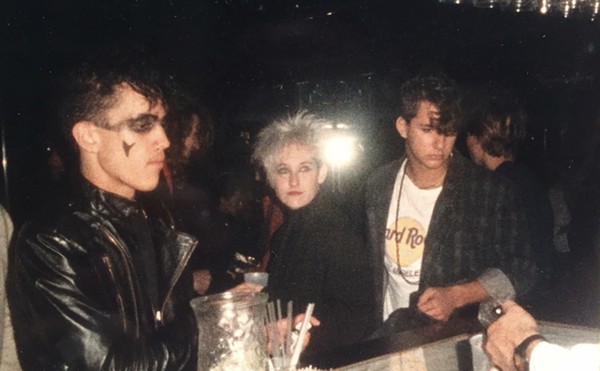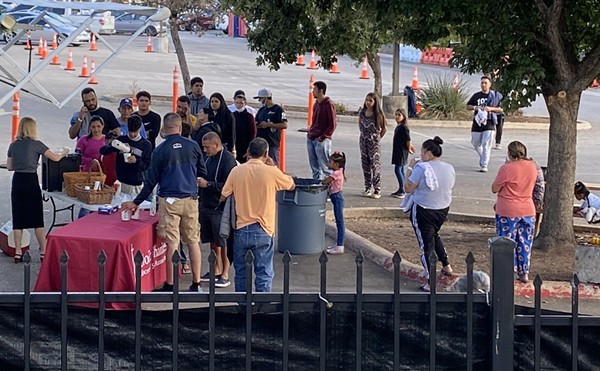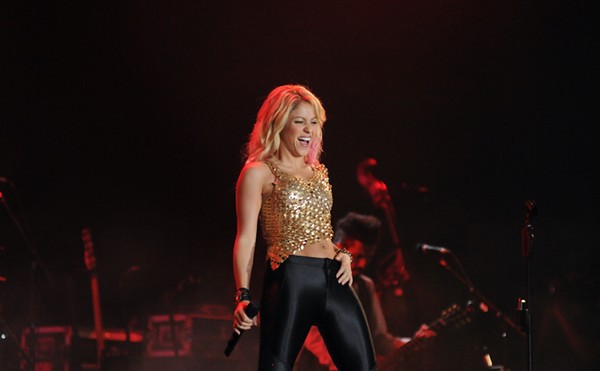The VW bus parks underneath I-35, and the members of Fields of Forel begin unloading their instruments. Though their equipment includes an electric guitar, a bass, an organ, and a heavy-looking upright piano, they’re tuning up within five minutes. Minimalist post-rock soon swells to fill the dark overpass. Splashing runoff from an early evening rainstorm and the clicking tires overhead provide incidental percussion while Justin Parr snaps the photograph that’s now sitting at the top of this page.
This is one of the major perks of writing about music: You can occasionally convince a cool band to stage an impromptu private concert underneath a highway while you and your wife sit on the trunk of your car.
One of the hardest parts of music journalism, on the other hand, is that you have to come up with a way to gracefully segue from this scene to an anecdote about a song the group recorded with a former member of Menudo — featuring a recording of pianist Aurelio Laing taking a piss.
Well … we’re waiting.
Forget it.
The guys in Fields of Forel, who estimate they’ve been playing together in some form for the past dozen or so years, weren’t always into spontaneous public performance or live body-function sampling. They began as conventional musicians with regular aspirations that most likely never included playing under an overpass. Laing, in fact, played keyboard for Adrian y Destino, a Tejano band signed to Capitol Records. Ironically, it was the major-label deal — what many young musicians dream of — that finally convinced him to drop out of the business of music.
“If we did this for a living, none of us could afford to feed ourselves,” Laing said. In fact, many labels pay artists in advances against future record sales — often charging for production and promotional costs and requiring the musicians to pay back the difference if their album makes less money than expected. Getting a major label deal, in other words, can be worse than being unsigned. “`The label’s` a loan company,” he said.
This system (perhaps intentionally) also discourages experimentation, since taking risks can lead to bankruptcy for the musicians if the album doesn’t sell well enough.
“Each level of success takes a little piece of your art,” Laing said. “I never would have recorded a track where I urinated over the first half `on a major label`.”
The track in question, 2004’s “Intermission,” by Age of Anxiety — a group also featuring Fields of Forel bassist Nathan Slimane and guitarist Enrique Palacios with former Menudo member Raymond Acevedo on vocals — is a nearly indescribable art-prog freakfest marked by accordion, slide whistle, and bizzaro sped-up vocal effects, with the unmistakable sound of liquid gold splashing into a toilet bowel providing a white-noise backdrop not unlike the sound of runoff dripping from a highway overpass. (Segue accomplished, and, for the record, Laing doesn’t forget to flush.) But the noisy, self-consciously avant-garde sound collage is hard to reconcile with the laid-back beauty of Forel’s current, almost ambient output, which Slimane said the band has achieved through continually stripping down their sound.
“It’s a constant deconstruction,” Slimane said. “We’re progressively becoming more minimalistic.”
Palacios added: “We’re playing less notes, but making more noise.”
What Forel and Anxiety have most in common is a heady, alien sound that, considering current music trends, will not be topping the charts or packing a conventional venue anytime soon.
So Laing decided to go to medical school, opting for the dreaded fall-back career to support himself, making the music he wants to in his off hours. He’s currently a third-year medical resident at Christus Santa Rosa, and his day job seems to have informed his band’s sound.
Fields of Forel takes its name from a region in the subthalamic brain, an obscure term Laing discovered in med school, and he says many of the band’s songs are written using the Fibonacci sequence, a series of numbers important in both biology and math in which each number is determined by adding the sum of the previous two, as in 1,1,2,3,5,8, ad infinitum. As the numbers in the series increase, Laing said, the ratio of consecutive numbers approaches phi, a non-repeating, non-terminating decimal (1.6180339) that many dub the Golden Section because of its supposed recurrence in the proportions found in nature, architecture, and even the stock market. For this reason, Laing said, many of the band’s songs are composed in 5/8 time. Because of the prevalence of 4/4 time in pop music Laing said, people tend to hear Fields of Forel’s music in progressions of 10, mentally reconciling it to the standard timing, making it sound at once familiar and strange.
Whether Fibonacci has anything to do with it, immediately familiar and strange is an apt description for their debut album Sleep | Study, a hard to classify work of quiet art augmenting the four piece’s ebb and flow with trombone, xylophone, choral arrangements, and field recordings of children playing, for a complete, sophisticated album that sounds at times almost like Steve Reich conducting Radiohead.
Though the day jobs of the band’s other members don’t have the same obvious impact on the music, their busy professional lives dictate the band’s gig schedule (or more often the lack thereof).
Slimane, who spends office hours as a civil and criminal trial attorney explains: “We’ve all got enough experience in music to know that we aren’t going to make money doing this.”
They work, then, and get together to play when their schedules allow. And none of them have chosen the stereotypical musician-friendly jobs — record-store clerk, events promoter, welfare recipient, etc. Instead, Palacios is a sales rep, and organist Daniel Arrañaga is a college student majoring in biological anthropology and moonlighting at a sporting-goods store. None of these occupations allows for much rehearsal time, and scheduling gigs in advance is often impractical, so the band gets together a few times each month, often loading up the bus and heading for a public space to park and set up. Though the band has played “real” gigs, their booking options are fairly limited, Palacios said.
“You can’t play this kind of music at a club,” he said. “They’re not going to get it.”
In an outdoor public place, though, where the audience can come and go as they choose, Slimane said, the band quickly discovers who’s enjoying the show.
“We have an audience of transients,” he said. “They come by, and stop if they enjoy it. If not, they move on. It’s amazing the variety of people who do get it.”
A few of those who pause, Laing said, are simply responding to the DIY aesthetic of a band creating its own gig on the side of the road.
“Some people are just impressed that we’re crazy enough to have a piano out in the street,” he said. “And,” he adds laughing, “some people just like the bus.”
Regardless of whether people stop to listen, Laing said, the band keeps playing.
“If we’re rusty, it’s a practice,” Laing said. “If people show up, it’s a concert.” •

















